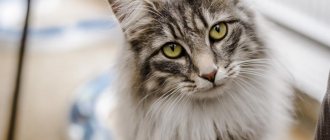“A cat is an animal that walks on its own”, “cats love everyone who feeds them” - these phrases are very often heard in conversations about representatives of the cat family, because many people are still sure that cats, unlike dogs, do not capable of feeling love for their owners. But those who have these fluffy, purring animals living in their homes clearly refute the claims that cats lack affection for people, since they have seen from their own experience that their pets are quite capable of love, but they don’t experience it for everyone.
Dogs, being pack animals, very quickly become attached to people and happily get to know and play with all the guests and friends of their owner, but cats are more picky. When meeting a new person, an adult cat may hiss, refuse to be stroked, and even scratch an overly annoying animal lover, and the cat, as a rule, treats members of the owner’s family differently - some are constantly caressed, while others are he can barely bear it. Let's try to figure out what kind of people cats love and how an owner can earn the sympathy of a purring pet if he initially dislikes it.
What kind of people do cats like?
The answer to the question of what kind of people cats love lies in the psychology of these animals, namely, in the peculiarities of their lifestyle and preferences. Cats love comfort and warmth, they can bask in the sun for hours and sleep up to 20 hours a day, and also spend a lot of time taking care of themselves - licking their fur and paws, “washing themselves,” etc. Most of the time cats behave independently , leisurely and measured, and only sometimes they want to run, jump, sharpen their claws and chase each other or live or toy mice. Therefore, representatives of the cat family love people whose habits resemble them. And vice versa, cats treat with distrust and wariness those people who are very different in behavior from purrs - they fuss, make a lot of sudden movements, are in constant tension, etc.
Animal psychologists, observing cats and their owners, have found that cats show love and affection for people who seem understandable to them and at the same time do not pose a danger to them.
And cats determine this very degree of similarity and human safety by the following criteria:
- Voice. Cats are attracted to people with a pleasant timbre of voice, who speak calmly, slowly and with soft intonations. And since nature has endowed women with a more gentle and pleasant-to-hear voice, it is not surprising that cats often love the fair sex more than men. However, a cat may well get used to a man’s voice and fall in love with its owner if he does not scream, hiss and make other sounds that are frightening and unpleasant for the animal in her presence.
- Movements. Cats like people who move slowly and leisurely much more than fussy and impetuous individuals, since these animals can perceive sharp swings of their arms, a swift gait and any impetuous movements as a potential threat to themselves.
- Smell. Everyone knows about the ability of dogs to distinguish many odors, but few people know that cats also have a very sensitive sense of smell and, not least of all, evaluate new acquaintances by smell. As a rule, felines do not like people who smell like dogs, other cats, alcohol, vinegar, or too strong perfume.
- Attitude towards the cat. Surely many cat owners have noticed that their furry purrs show much more sympathy for those guests who are indifferent to them, but they avoid people who immediately try to pick up or stroke the animal. The explanation for this love of cats for those who do not pay special attention to them is simple: cats, being independent animals, value their personal space and really do not like annoying pesters. The animal will most likely hide from a person trying to stroke and cuddle an unfamiliar cat at the first opportunity. However, natural curiosity is also inherent in cats, so sooner or later they will want to get to know and study a person who is next to them, but who is not paying attention to them.
Of all the family members, the cat will most likely choose the calmest person as his owner and pet, who feeds and cares for the animal, but at the same time does not impose his love on him - does not try to constantly squeeze and stroke him, does not bother him during sleep and rest, etc. And vice versa, cats are often indifferent to children and do not like to play with children too much, since these independent animals do not like to be carried for a long time in their arms, squeezed, dragged by the tail, and even more so, dressed up like a doll.
Generation choice
Millennials invest a lot of effort and money, purchasing literally everything for their pets: from comfortable sofas and a variety of treats, to a mini-wardrobe for dogs and cats with overalls for all occasions. Judging by how much we care about making a pet’s life comfortable and its appearance stylish, little furballs are now real and full-fledged members of the family.
According to the US Census Bureau, the number of married couples who do not have children for one reason or another has increased over the past few years. In 1970, 40% of couples had children; by 2012, the figure dropped to 20%. Of course, the data does not take into account children who grow up in a civil marriage, but the changes in people’s attitudes towards fatherhood and motherhood are clear: the family and its concept are changing.
The US Bureau of Statistics found that between 2007 and 2011, childless couples spent more on pets than the average family spends on their child. Thus, young people are more likely to have a pet than to become parents. This situation accordingly fuels the pet industry, which has tripled since 1996.
A survey of 8,000 Gen Xers and baby boomers conducted by Qualtrics and Accel found that 27% of participants do not want pets, 44% strongly do not want children, and the rest are unsure about their choice. While the study suggests the trend is due to participants wanting to maintain their independence, the reality is more complex.
How to make friends with a cat?
Domestic cats are capable of becoming attached to their owner almost as strongly as dogs, but in order to become friends with a cat, it is not enough just to feed and stroke the purr from time to time. According to animal psychologists, it is much easier to achieve love and affection from a kitten than from an adult cat, since kittens perceive anyone who cares for them as their mother.
But in order to win the heart of an adult animal, in addition to the direct responsibilities of caring for the cat, the owner needs to do the following:
- Do not do anything that the animal may perceive as aggression (do not look intently into the cat’s eyes, do not wave your arms near it, do not grab it in your arms when it is sleeping, do not throw it up or crush it during play, etc.)
- Under no circumstances should you show aggression towards a cat or take out negative emotions on it - many felines are vindictive and can remember an insult inflicted by a person for many years
- Behave calmly and evenly in the presence of an animal , do not raise your voice in front of or towards a cat
- Show respect for the animal - do not disturb its sleep, do not suddenly grab it, do not drag it by the tail even as a joke, do not take away food, etc.
- Find a way to bring joy to the animal - from time to time, in addition to the main food, give it special treats, play with the cat with its toys, allow it to sit on your lap and take it to bed with you, without squeezing or tugging the animal, take the cat out walk outside, etc.
These simple measures are aimed at ensuring that the animal always feels calm, pleasure and joy in the presence of the owner, and begins to associate these positive emotions with him. And with the right approach to keeping and communicating with a cat, sooner or later this independent animal will definitely change its anger to mercy and fall in love with its owner. And it’s very simple to find out when this moment comes - the cat will respond to your gaze with a direct gaze, blink several times, and then, without looking away, come up to be stroked and caressed.
So why do we love these animals?
Cats are not known for their calm disposition and obedience. They often drop flowers from the windowsill, tear curtains, chew shoes and clothes, steal goodies from the table - in general, they create “complete chaos” in our lives... However, there are qualities in them for which we love our domestic cats and forgive them everything.
- They are cute . Especially kittens with their beautiful faces, small paws, clumsy and funny behavior. You want to take care of such a baby, play with him, hold him in your arms.
- They have a carefree and playful disposition . These creatures are unpredictable. Now your cat is sleeping curled up in a chair, and a few minutes later a vase falls with a crash in the living room, and a mustachioed prankster looks at a pile of fragments from above without a single hint of guilt - it’s impossible to get bored with such pranksters.
- Cats are independent and unobtrusive . Possessing the ability to subtly sense the mood of the owner, the animal understands when it is possible to approach him and cuddle him, and when he can fall under the “hot hand” and get hit on the ears.
- Cats can live in the house without going outside . This is a great advantage for those who, due to their workload, cannot find time to walk with their pet. And if the animal also goes to the toilet on its own and uses the toilet, caring for it will not be difficult at all.
- Cats are silent by nature . Unlike some sociable animals, the “mustachioed striped” pet will not pester you with its “talks”. Only as a last resort - if he has some need.
- Cats react calmly to children . It is not uncommon to see a child dragging a cat up with his paws, and the cat is so calm that it seems as if he has been moving like this all his life. And a cat whose child carries in a stroller is a “classic”, they simply enjoy their role as a “baby”.
- The hunting abilities of cats also win the hearts of many people. Our pets are born with a predatory instinct. They catch small animals, rodents and insects.
- They are warm and fluffy . Often cats cuddle up to us or lay down directly on us, warming us with their fur and the warmth of their bodies. You can warm your hands, feet, ears with them - it all depends on your imagination and the cat’s willingness to work as a heating pad.
I could go on for a very long time... there are a lot of reasons why we love these furry pranksters.
Loyalty, loneliness and care
When it comes to children, many people panic about the new life, responsibility and financial costs. A dog or cat is, in a sense, the same child with whom you can establish a special spiritual connection. Animals help cope with anxiety and loneliness.
A pet is a faithful friend who is always ready to “listen”, partially understand and will never betray. With its help, couples make up for some lack of communication. The affection and positive attitude of a little bundle that is always waiting at home can reduce the level of stress received at work and in society. A wagging tail and a funny walk at the end of a hard day is the best therapy.
In addition, caring for someone, loving and giving brings pleasure. And some couples, in order to satisfy this need and show unspent attention, get a pet rather than a child, because they believe that it is much easier to cope and provide life for the first one than for a small person. All of these factors play a big role in why we get pets, but Quatrics and Accel noted that the main reasons why millennials choose dogs and cats over children are not due to a simple lack of desire or finances, but due to concerns about that until the baby reaches adolescence, he will limit his healthy and active lifestyle in every possible way. Animals do not require the sacrifices that are necessary to raise a small person. Of course, they also require care and walks, but they can be left at home while the couple goes to work or to meet friends, and not worry about something bad happening, of course, if you first hide the wires, which can be easily chewed . It is impossible to leave a child who cannot take care of himself. This desire for freedom can be fundamental in the conscious refusal of children and the adoption of the childfree philosophy.
You should not compare feelings for pets and children. Raising the latter is, in fact, not the same as caring for a pet. After all, pets may be in some ways a rehearsal for future parenthood, and in other cases, this choice may have deeper reasons why millennials choose to have kittens rather than children.











